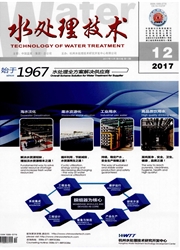

 中文摘要:
中文摘要:
通过间歇试验探讨了COD对反硝化抑制硫酸盐还原系统的影响。结果表明,COD是反硝化抑制硫酸盐还原系统的一个重要因素,直接影响着系统中NO3-和SO42-的代谢以及S2-和NO2-的产生状况;当COD为120mg/L时,系统内碳源不足,存在着SRB和DNB对碳源的竞争,竞争中后者占优势,硫酸盐还原程度很小;当碳源充足时,由于受反硝化抑制,S2-呈现出先增加后减少再增加的变化趋势,分为碳源充足、反硝化控制和硫酸盐重新还原三个阶段,各阶段的作用时间随COD含量的不同而变化;系统中出现了不同程度的NO2-积累,其峰值和出现位置随COD不同而不同;NO2-是对SRB产生抑制的主要原因,当系统中NO2--N浓度大于2mg/L时,S2-产生呈下降趋势,SRB活性开始受到抑制。
 英文摘要:
英文摘要:
A intermittent experiment was conducted to investigate effect of COD on the process of denitriflcation inhibiting sulfate reduction. The experimental results showed that COD was an important ecological factor in the system, directly influenced metabolizing of NO3^- and SO4^2-, as well as producing of S^2- and NO2^- .When COD = 120mg/L, the system had lack of carbon source, and there was a competition for carbon source between SRB and DNB. Due to the latter prevailing, the sulfate reducing degree was very small. When carbon source was sufficient, due to the inhibiting of denitrification, S^2- had a change trend of increasing-reducing-increasing. It included three stages, such as carbon source abundance stage,denitrification controling stage and SRB regrowing stage. Time of each stage changed with the changing of COD. There was a accumulation of NO2^- to different degree in the system, the peak value and time appearing varied with COD. NO2^- was the main reason of inhibiting sulfate reducing; when the concentration of NO2-N exceeded 2mg/L in the system, a lowering trend of the S^2- production all appeared, and the activity of SRB began to be inhibited.
 同期刊论文项目
同期刊论文项目
 同项目期刊论文
同项目期刊论文
 期刊信息
期刊信息
